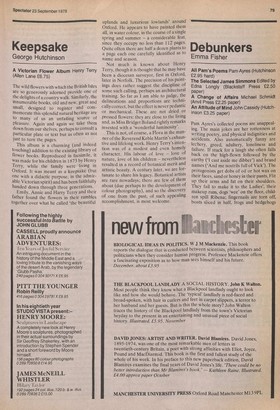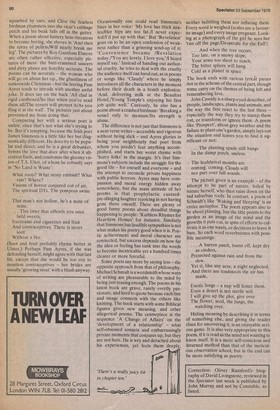Debunkers
Emma Fisher
All Pam's Poems Pam-Ayres (Hutchinson £2.95 hard) The Selected James Simmons Edited by Edna Longly (Blackstatt Press £2.50 paper) A Change of Affairs Michael Schmidt (Anvil Press £2.25 paper) An Attitude of Mind John Cassidy (Hutchinson £3.25 paper) Pam Ayres's collected poems are unappealing. The main jokes are her rottenness at writing poetry, and physical indignities and accidents. Also automatically funny are lechery, greed, adultery, loneliness and failure. If stuck for a laugh she often falls back on the high-flown followed by the earthy CI cast aside me dibber') and brand names ('And me nostrils full of Vick'). The protagonists get dobs of oil or hot wax on their faces, sand or honey in their pants, Flit up their arms and fat on their shoulders. They fail to make it to the Ladies', their makeup runs, dogs 'wee' on the floor, children spill Ribena; fingernails are torn off, boats sliced in half, frogs and hedgehogs squashed by cars, and Clive the fearless birdman plummets into the vicar's cabbage patch and his beak falls off in the gutter. When a poem about battery hens threatens to become boring, she shoves in 'And then the spray of pellets/Will nearly break me leg'. The pictures by Roy Garnham Elmore are often rather effective, especially pictures of mess: the butt-crammed saucers and dirty plates are horribly accurate. The poems can be accurate — the woman who will go on about her op., the ghastliness of nationwide Christmas but the leering Pam Ayres tends to intrude with another awful joke. It does say on the back 'All clad in rigid cardboard/So that when you've read them all/The covers will protect it/As you fling it at the wall'. The pictures just about prevented me from doing that.
Comparing her with a serious poet is unfair, since that's not what she's trying to be. But it's tempting, because the Irish poet James Simmons is a little like her but diagnostically different. He does try to be popular and direct; and he is a great debunker, hymns the love that does alter when it alteration finds, and condemns the gloomy vision of T.S. Eliot, of whom he robustly says in 'No Land is Waste': What roots? What stony rubbish? What rats? Where?
Visions of horror conjured out of air, The spiritual DTs. The pompous swine That man's not hollow, he's a mate of mine.
. . . This litter that offends you once held sweets, Icecreams and cigarettes and fruit And contraceptives. There is never soot Without a fire.
(Soot and fruit probably rhyme better in Ulster.) Perhaps Pam Ayres, if she was defending herself, might agree with that last bit, except that she would be too coy to mention contraceptives — her brides are usually 'growing stout' with a blush anyway. Occasionally one could read Simmons's lines in her voice: 'My love has thick ankles/Her hips are too fat.fl never expected/I'd put up with that.' But 'Revelation' goes on to be an open confession of weakness rather than a grinning send-up of it: 'Convenience became /Revelation today.fYou are lovely. I love you,'/I heard myself say.' Instead of handing out authorial cruelty, he tries to deal with the cruelty the audience itself can hand out, as in poems or songs like 'Claudy' where he simply introduces all the characters in the moment before their death in a bomb explosion: 'And, delivering milk at the Beaufort Hotel,/Young Temple's enjoying his first job quite well.' Curiously, he also has a poem about a crashed birdman: 'Breaking a vessel only to measure/Its strength is abuse.'
The difference is not just that Simmons is a neat verse writer — accessible and vigorous without being slick — and Ayres glories in being your neighbourly bad poet from whom you needn't fear anything accomplished, and starts her worst rhyme with 'Sorry folks' in the margin. It's that Simmons's subjects include the struggle for the good life — for oneself and everyone — and the attempt to reconcile private happiness with public horrors. Ayres may have compassion and moral energy hidden away somewhere, but the main attitude of her poems is that prophylactic custardpie-slinging laughter rejoicing in not having gone there oneself. There are plenty of good funny poems about dreadful things happening to people: 'Ruthless Rhymes for Heartless Homes' for instance. Similarly that Simmons has (audible sympathies is not what makes his poetry good when it is. Poetic achievement and moral character are connected, but success depends on how far the idea or feeling has sunk into the words to become inextricable yet a hundred times clearer or more forceful.
Some poets say more by saying less — the opposite approach from that of philosophy.
Michael Schmidt is a wordsmith whose ways of writing are pleasurable to the mind by being just teasing enough. The poems in his latest book are grave, rarely overtly passionate, and hard to quote because each line and image connects with the others like knitting. The book starts with some Biblical figures given new meaning, and other allegorical poems. The centrepiece is the sequence 'A Change of Affairs' on the 'development of a relationship' — what self-obsessed sonnets and embarrassingly private moments that conjures up, but they are not here. He is wry and detached about his experiences, yet feels them deeply, neither belittling them nor inflating them. Every word is weighed (scales are a favourite image) and every image pregnant. Looking at a photograph of the girl he sees her 'run off the page/Desperate for the Fall': . . . And when the tree occurs, Too late, on a snowy slope, Your arms too short to reach, The bitter sphere will hang Cold as a planet in space.
The book ends with various lyrical pieces not in the scheme of the central part, though some carry on the themes of being left and remembering love.
John Cassidy is a sharp-eyed describer, of people, landscapes, plants and animals, and the way the first react to the last three — especially the way they try to stamp them out, or transform or ignore them. A poem like 'Prospect', about grey weather and the failure to plant one's garden, simply lays out the situation and leaves you to find it significant or not: . The planting spade still hangs In the damp porch, useless.
. The leafshrivel months are coming, coming. Clouds will not part over full woods.
The picture given is an example — of the attempt to be part of nature, foiled by nature herself, who then rains down on the sad suburban roofs. In contrast, a poem of Sclunidt's like 'Waking and Sleeping' is an entire metaphor. The poem appears also to be about planting, but the title points to the garden as an image of the mind and the growths it puts out, in spite of efforts to cultivate it as one wants, or decisions to leave it bare. So each word reverberates with possible meanings: . .. A barren patch, burnt off, kept dry as cinders, Protected against rain and from the dew.
Yet it, like any acre, a night neglected, And there are toadstools the air has made, Exotic lungs — a nap will foster them. Even a desert is not sterile soil. I will give up the plot, give over The flower, seed, the lungs, the watching over.
Hiding meaning by describing it in terms of something else, and giving the reader clues for uncovering it, is an enjoyable serious game. It is also very appropriate to this poem, if it is read as the mind not wanting to know itself. It is a more self-conscious and inturned method than that of the meticulous observation school, but in the end can be more satisfying as poetry.



































































































 Previous page
Previous page